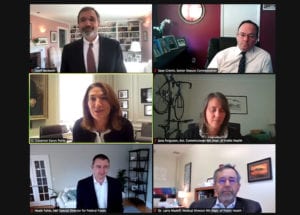Who is a member?
Our members are the local governments of Massachusetts and their elected and appointed leadership.

State and local leaders convened on Zoom to discuss the reopening process. Pictured are (top row, l-r) MMA Executive Director Geoff Beckwith; Sean Cronin, senior deputy commissioner at the Division of Local Services; (middle row, l-r) Lt. Gov. Karyn Polito; Jana Ferguson, assistant commissioner at the Department of Public Health; (bottom row) Heath Fahle, special director for federal funds at the Executive Office of Administration and Finance and Dr. Larry Madoff, medical director at the Department of Public Health.
More than a year into the COVID-19 state of emergency, state and local officials were facing forward yesterday afternoon as they discussed changes coming in the weeks and months ahead.
During the 35th regular conference call convened by the MMA, Lt. Gov. Karyn Polito discussed the administration’s plans — announced just hours earlier — to further reopen businesses and allow more activities, in stages set for April 30, May 10, May 29 and Aug. 1, when all restrictions will be dropped if case counts and vaccine rates continue their current trends.
With 5.7 million vaccine doses administered and 2.3 million residents fully vaccinated, Massachusetts remains the per capita leader among the 24 states with populations of 5 million or more, Polito reported. Massachusetts has the lowest vaccine hesitancy rate in the country, and the vaccine rate for Black and Hispanic residents is twice the national average, she said. Vaccines are being administered at a rate of 40,000 to 50,000 per day.
“Look how far we’ve come, and why we’re able to make those announcements,” she said.
She urged local officials to continue using their social media and other communications to promote the effectiveness and safety of COVID vaccines.
Polito said the Aug. 1 target for lifting restrictions is not the same as the end of the emergency declaration, which is a separate decision.
She said the administration would form a small working group with the MMA to address issues that arise as city and town halls begin to more fully reopen. She said local legislative bodies, such as town meetings, are exempt from restrictions on gatherings, though masks and distancing are still recommended.
Polito also reminded local officials to take advantage of the Shared Streets and Spaces and Destination Development Capital grants, both of which are intended to boost business districts and are accepting applications through May 21. Applications are also being accepted for 10 grant programs through the Community One Stop for Growth program.
She also suggested that communities re-examine their zoning to see if they can do more to accommodate outdoor dining, as was done last summer, on a permanent basis.
Heath Fahle, special director for federal funds at the Executive Office for Administration and Finance, said there’s no news yet from the U.S. Treasury Department about allocation amounts and usage guidance for the $1.9 trillion American Rescue Plan Act, but both are expected shortly, as the statutory deadline to disburse the first half of the funding is 60 days after enactment, which was March 11. The ARPA includes $360 billion for State and Local Government Fiscal Recovery Funds, as well as a range of targeted relief funds.
Fahle reminded local officials that the package contains a lot more than the $130 billion going directly to municipal and county governments — some $3.4 billion of which will land in Massachusetts. The non-local aid programs include a restaurant revitalization program, shuttered venue operators grants, a number of economic development and business assistance programs, and additional funding for rental, mortgage and child care assistance. Applications opened last week for the broadly defined restaurant program, which includes food trucks, caterers and other food services, and the shuttered venues program.
Fahle added that it is a best practice to make as much use as possible of the Federal Emergency Management Agency’s Public Assistance program, which now provides 100% reimbursement for eligible pandemic-related expenses incurred between January 2020 and through Sept. 30 of this year. Local leaders are encouraged to contact their Massachusetts Emergency Management Agency field representative about this funding stream, if they haven’t already done so.
• Audio of April 27 call with administration (36M MP3)